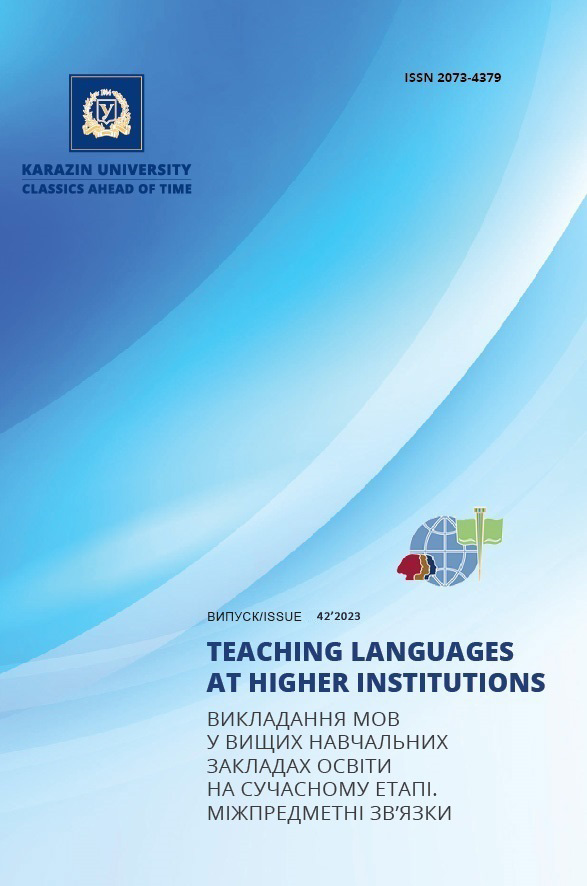Teaching future doctors using medical terminology in professional communication
Abstract
The need for communication is fundamental for humans. Communication is an integral element of peopleʼs existence, the most important condition for full-fledged formation and development of personality. Modern science considers communication as an exchange of information, interaction, and perception of a person by a person. The entire system of human attitudes towards other people is realized in communication. It covers various areas of social interaction of people including the professional field of activity. Interpersonal communication is mostly dialogic and is an indispensable component of professional medical activity. It largely determines the relationship between the doctor and the patient from the very beginning and contributes to the establishment of the necessary trust between them.
The article includes an analysis of recent publications devoted to investigations of the issue of training future foreign doctors in professional communication in institutions of higher education. The article highlights the need of modern society for specialists of high culture who possess professional communication skills, high adaptability, and professional mobility.
The authors emphasize that the modern language training of a future foreign doctor should be focused on teaching the situational and contextual adequate use of language as a means of oral and written communication in all areas of professional communication.
The professional speech of future medical workers is the mastery of literary language norms, professional terminology, and standardized constructions of the medical field, the ability to use language tools in accordance with the purpose and situation of communication.
The authors hope that a short-term Ukrainian language medical terminology course for foreign students of the third year of a school of medicine developed by the teachers of the Language Training Department of International Education Institute for Study and Research of V.N. Karazin Kharkiv National University will help students to master professional language skills. The course is designed for 20 hours of classroom practical lessons. The proposed course implements the set tasks in the formation of the terminological competence of medical students, contains the most productive teaching methods, and defines the stages of dealing with professional vocabulary: 1) presentation of new vocabulary; 2) automation of lexical skills; 3) organization of repetition of studentsʼ acquisition of vocabulary and quality control of the previously learned material.
The authors see prospects for further research in identifying the conditions for the formation of the readiness of medical students for professionally oriented communication, in the design of the model of formation of the culture of the future specialist under the conditions of professionally oriented communication and experimental verification of its effectiveness.
Downloads
References
Avramenko, N.O. (2019). Preparation of future doctors-foreigners for mastering professional terminology in medical institutions of higher education. Сandidateʼs thesis. Khmelnytskyi: Khmelnytskyi National University. Available at: https://shron1.chtyvo.org.ua/Avramenko_ Nataliia/Pidhotovka_maibutnikh_likariv-inozemtsiv_do_ovolodinnia_profe siinoiu_terminolohiieiu_u_medychnykh_za.pdf? [in Ukrainian].
Aleksieienko, T.M., Vasetska, L.I., Kushnir, I.M. (2019). Teaching the professional dialogue: The doctor and the patient. Kharkiv: V.N. Karazin Kharkiv National University [in Ukrainian].
Akhmedova, N.D, Mamadzhanova, M.R., Buranova, N.Sh. (2018). Professional communication and etiquette of the future doctor. Achievements of Science and Education. 16 (38). Available at: https://cyberleninka.ru/article/n/professionalnoe-obschenie-i-etiket-budusc hego-vracha [in Russian].
Zolotukhin, H.O., Lytvynenko, N.P., Misnyk, N.V (2001). Fakhova mova medyka [Language of medical professionals]. Kyiv [in Ukrainian].
Alekseenko, T.M., Kushnir, I.M., Manivska, T.Ie., Ushakova, N.I. (2021). Communicative training for foreign students of medical specialties: a textbook for English-medium students. Ushakova, N.I., Alekseenko, T.M. (Eds.). Kharkiv: V.N. Karazin Kharkiv National University [in Ukrainian].
Kraievska, H.P. (Comp.). (2016). Ukrainska mova yak zasib profesiinoho spilkuvannia medyka (aktualni problemy suchasnoho medychnoho terminoznavstva) [The Ukrainian language as a means of professional communication of a doctor (urgent problems of modern medical terminology)]. Vinnytsia. Available at: https://dspace.vnmu.edu.ua/bitstream/handle/123456789/422/%D0%BC%D0%BE%D0%B2%D0%B0%20%D0%BF%D1%80%D0%BE%D1%84..pdf?sequence=1&isAllowed=y [in Ukrainian].
Ushakova, N., Alekseenko, T., Kushnir, I. (2022). Visual aids in teaching Ukrainian as a foreign language. Teaching languages at higher educational establishments at the present stage. Intersubject relations. 40, pp. 80–95. DOI: https://doi.org/10.26565/2073-4379-2022-40-06 [in Ukrainian].
Ushakova, N., Trostynska, O., Kushnir, I. (2022). Formation and development of the language training methodology for foreign students at classical universities. Part 3. Teaching the Ukrainian language. Teaching languages at higher educational establishments at the present stage. Intersubject relations. 41, 60–81. DOI: https://doi.org/10.26565/2073-4379-2022-41-04 [in Ukrainian].
Yukalo, V.Ia. (1977). Kultura movy [Language Culture: a manual for medical students]. Struhanets, L.V. (Ed.). Ternopil [in Ukrainian].

